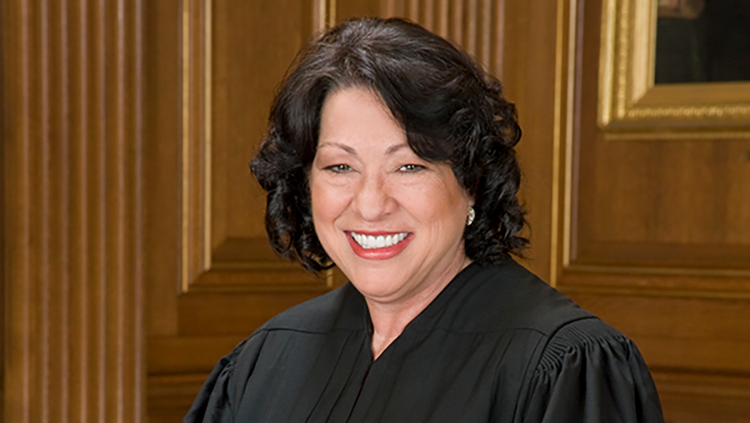Did Justice Sotomayor goof with ‘little if nothing’ phrase? Stickler law prof sees error

U.S. Supreme Court Justice Sonia Sotomayor.
A law professor who considers himself a stickler on proper use of the English language has written to U.S. Supreme Court Justice Sonia Sotomayor about a phrase she used in a dissent this month.
Regent University law professor James J. Duane told Sotomayor that she misused a phrase in this sentence: “Little if nothing appears left of the statutory exemptions after today’s constitutional broadside.”
“It is obvious that you meant instead to write ‘little or nothing’ or ‘little if anything’—two elegant ways of expressing the idea that ‘if there is anything at all, it will only be a little bit,’” Duane wrote in his July 14 letter.
The letter says Duane “would not quarrel with any creative spirit who chose to break with tradition to coin some clever but coherent method of making her point.”
But Sotomayor’s phrase “makes no sense at all,” Duane wrote. “What you wrote is a shorthand way of saying, ‘If nothing remains of those exemptions after today, it will only be a little bit.’ And that is absurd.”
Duane tells the ABA Journal he considers himself a stickler, particularly in regard to Supreme Court opinions that will be read for generations to come. He is “nearly certain” the phrase will be corrected in the official opinion reports.
Duane says he often spots spelling and usage errors in Supreme Court opinions, and he has written “a fair number of letters” to several justices to point out errors. In the past, only Justice Antonin Scalia and Justice Stephen G. Breyer have responded with “gracious notes of gratitude and acknowledgment.”
Usually Duane hears from the Office of Reporter of Decisions, which sends a form letter.
Duane points to an example of another error he spotted. In a per curiam opinion in 2012, the U.S. Supreme Court said that two police officers’ fear of violence was “imminently reasonable.” The right word was “eminently.”
Duane wrote to Chief Justice John G. Roberts Jr. to point out the error. It was corrected in the official report, but not in the Supreme Court Reporter.
The Supreme Court isn’t the only court to use the wrong phrase “imminently reasonable,” according to a 2009 Volokh Conspiracy post. A search of Westlaw’s database of all cases showed the phrase was used in more than 200 opinions.
Sotomayor used the “little if nothing” phrase in a dissent to a U.S. Supreme Court opinion holding that courts can’t hear job bias claims by teachers at religious schools who instruct students in the faith. Sotomayor argued the majority had overridden carefully tailored statutory exemptions for religious employers to produce a sweeping result.
The case is Our Lady of Guadalupe School v. Morrissey-Berru.
See also:
ABAJournal.com: “Supreme Court’s visible edits show misspellings and missteps; is there a ‘minuscule’ error?”



